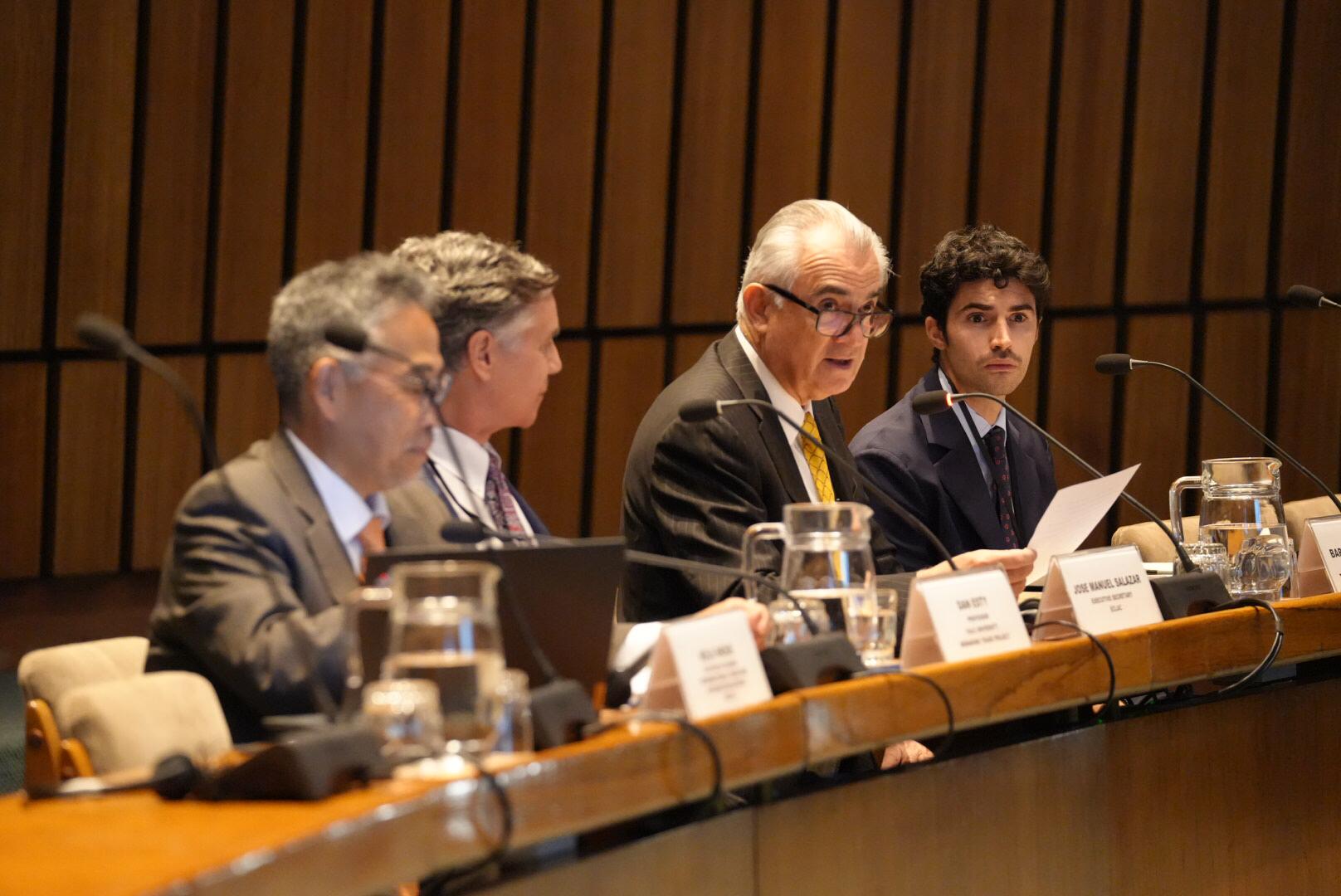Authorities and Experts Call for Joint Efforts to Align Trade Policies with Sustainability Goals
Topic(s)
During a high-level conference held at ECLAC, trade and sustainability thought leaders from across Latin America came together to advocate for a strengthened international trade system and better alignment of global commerce with the world community’s commitment to sustainable development. A number of speakers emphasized the value of cooperation on ideas to remake the trade system to be fit for purpose, especially in times of crisis such as the present.

Government authorities from various countries in the region along with experts on the reform of the global trade system gathered at the headquarters of the Economic Commission for Latin America and the Caribbean (ECLAC) in Santiago, Chile. The event aimed to discuss, from a Latin American and Caribbean perspective, on how to achieve better integration between international trade, environmental sustainability, and the green transition.
The high-level meeting, titled "Pursuing Greater Alignment Between Trade and Sustainability: A Latin American Perspective," took place on March 20-21, 2025. It was organized by ECLAC in collaboration with the Remaking Global Trade for a Sustainable Future Project and the Technology and Industrialization for Development Center (TIDE) at the University of Oxford.
The event featured the participation of deputy trade ministers from the region, as well as business executives, academics, environmental leaders, and other civil society representatives. The conference included panels on trade and geopolitics, sustainability, the digital economy, biodiversity, and value chains, among other topics. Participants analyzed the challenges and opportunities arising from changes in global trade dynamics, addressing issues such as the rise of protectionism, technological decoupling, and increasing sustainability requirements in international trade. They also explored strategies to leverage regional cooperation and integration, diversify trade alliances, and position Latin America as a global leader in the green transition.
The event was inaugurated by José Manuel Salazar-Xirinachs, Executive Secretary of ECLAC; Dan Esty, Professor at Yale University (United States) and co-lead of the Remaking Trade project; and Baptiste Albertone, representative of TIDE at the University of Oxford.
Key speakers included Marcela Otero, Director of Multilateral Economic Affairs at the Chilean Ministry of Foreign Affairs; Tatiana Prazeres, Secretary of Foreign Trade at Brazil’s Ministry of Industry, Foreign Trade, and Services; and Francisco Rivadeneira, Executive Director of the Ecuadorian Business Committee (CEE) and former Minister of Trade of Ecuador, among other distinguished figures.
"We are living in unprecedented times. The global trade system is under immense pressure due to increasing geopolitical tensions, supply chain fragmentation, and the weakening of the rules-based international order. This moment of crisis forces us to reassess not only the functioning of the World Trade Organization (WTO) but also the effectiveness of other international organizations, development banks, and UN institutions in responding to these evolving challenges," emphasized José Manuel Salazar-Xirinachs in his opening remarks.
"Our goal with this event is to reflect, from a Latin American and Caribbean perspective, on how to better integrate international trade with the pursuit of more productive, inclusive, and sustainable development. Our region has much to contribute in this regard, given its vast biodiversity, relatively clean energy matrix, and large reserves of strategic minerals, among other assets," added the senior UN official.
While acknowledging the challenging politics of the current moment, Professor Esty declared that the “need for international cooperation and intensified efforts to ensure that the trade system supports sustainable development has never been greater.”
Meanwhile, Babtiste Albertone explained that "faced with the consolidation of a new global mercantilist moment, it is crucial that the developing world in general, and Latin America in particular, is aware of its power to influence the future of multilateralism and sustainable development”
During the first day of the event (Thursday, March 20), the Executive Secretary of ECLAC presented the organization's assessment of the development challenges facing Latin America and the Caribbean. He highlighted that the region’s countries are mired in three major traps: low capacity for economic growth, high inequality with limited social mobility and weak social cohesion, and fragile institutions with ineffective governance.
"Escaping the low-growth trap requires advancing toward a new generation of productive development policies that accelerate economic and industrial transformation toward a more socially inclusive and environmentally sustainable model, while also increasing the rate of growth and job creation," Salazar-Xirinachs emphasized.
"We have identified a set of dynamic and transformative sectors that, within what we call the ‘great environmental push,’ include areas such as the energy transition, electric mobility, the circular economy, the bioeconomy, sustainable agriculture and bioindustrialization, sustainable water management, and sustainable tourism, among others… This approach involves adopting productive development policies that strategically integrate trade, foreign direct investment (FDI), and sustainability goals," he added.
Related content

Country(ies)
- Latin America and the Caribbean